The Myrcene Market is estimated to be valued at USD 110.8 million in 2025 and is projected to reach USD 168.8 million by 2035, registering a compound annual growth rate (CAGR) of 4.3% over the forecast period.
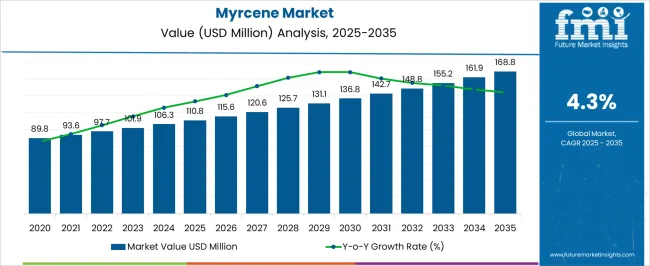
| Metric | Value |
|---|---|
| Myrcene Market Estimated Value in (2025 E) | USD 110.8 million |
| Myrcene Market Forecast Value in (2035 F) | USD 168.8 million |
| Forecast CAGR (2025 to 2035) | 4.3% |
The Myrcene market is experiencing steady expansion, supported by its growing role as a key building block in fragrance formulations, flavors, and other specialty chemical applications. In 2025, the market outlook reflects increasing demand from industries focused on natural and bio-based ingredients, as manufacturers continue to move away from synthetic substitutes.
The emphasis on sustainable production practices and renewable chemical feedstocks has positioned Myrcene as a highly relevant compound in global value chains. Consumer preference for natural fragrances and flavors is also playing a pivotal role, particularly in the personal care and food industries, where product differentiation is heavily influenced by aroma and taste.
Furthermore, rising research in bio-derivatives and active compounds derived from Myrcene is opening pathways for broader application in pharmaceuticals and nutraceuticals This alignment with industry trends in sustainability, consumer wellness, and innovation is expected to reinforce future demand, ensuring that Myrcene remains a critical raw material in several high-growth verticals.
The myrcene market is segmented by concentration, application, and geographic regions. By concentration, myrcene market is divided into ≥ 90% Myrcene, ≤ 80% Myrcene, and 80% - 90% Myrcene. In terms of application, myrcene market is classified into Fragrance Intermediate and Flavor Intermediate. Regionally, the myrcene industry is classified into North America, Latin America, Western Europe, Eastern Europe, Balkan & Baltic Countries, Russia & Belarus, Central Asia, East Asia, South Asia & Pacific, and the Middle East & Africa.
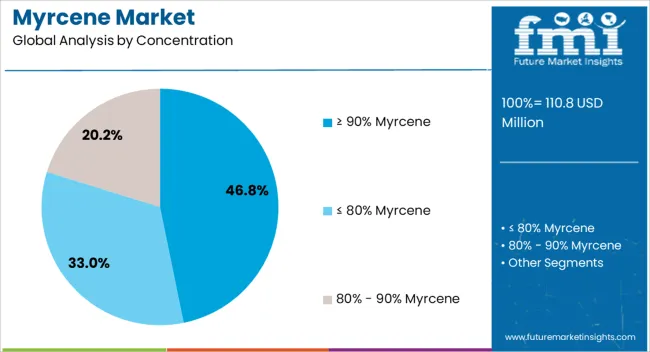
The concentration segment of ≥ 90% Myrcene is projected to hold 46.80% of the total revenue share in the Myrcene market in 2025, positioning it as the leading subsegment. This leadership is being attributed to its high purity level, which makes it suitable for consistent performance in fragrance, flavor, and pharmaceutical formulations where quality and stability are crucial.
The growth of this subsegment has been supported by increasing consumer demand for natural and premium grade ingredients in personal care and food products. Manufacturers have prioritized high purity Myrcene due to its superior ability to deliver uniformity in large-scale production, reducing variability in final applications.
Regulatory trends encouraging the use of cleaner and safer raw materials have also amplified the adoption of ≥ 90% concentration Myrcene The scalability of production methods, combined with its adaptability for downstream synthesis, ensures that this segment continues to gain preference among end users seeking reliable and sustainable raw material solutions.
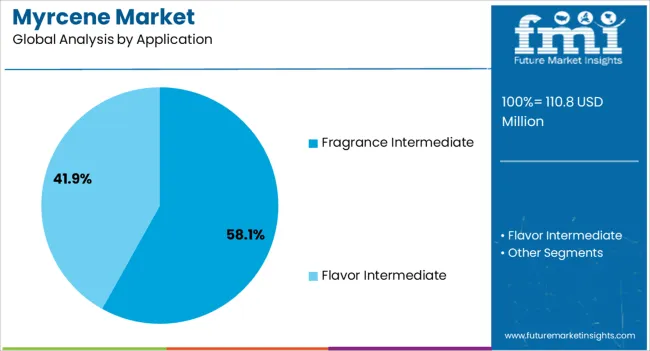
The application segment of Fragrance Intermediate is expected to account for 58.10% of the Myrcene market revenue share in 2025, making it the most dominant application area. This position has been achieved due to the extensive use of Myrcene as a foundational ingredient in perfume and aroma formulations, where it provides versatility and acts as a precursor for high-value aroma chemicals.
The segment’s growth has been influenced by increasing consumer spending on personal care and lifestyle products, with fragrance playing a central role in product appeal. Global demand for natural and renewable aromatic chemicals has further elevated the role of Myrcene in formulations where synthetic alternatives are being replaced.
Its chemical properties enable it to be easily transformed into multiple fragrance derivatives, enhancing its strategic importance for producers As emerging economies continue to show rising demand for premium fragrances and cosmetics, the role of Myrcene as a fragrance intermediate is expected to remain vital, ensuring continued dominance of this subsegment.
Dihydromyrcene is a colorless organic compound that belongs to the acyclic terpenic alcohols family. Dihydromyrcene is the main constituent chemical used to impart fragrance to personal care and cosmetic products. Rising consumer spending on personal care & cosmetic products and increasing consumption of fragrance chemicals in detergents and soaps are the prime factors that fuel the fragrance chemical market, which in turn is expected to drive the dihydromyrcene market. Increasing urbanization, population, changing living standards and rising per capita disposable income are some of the major factors significantly affecting the dihydromyrcene market. With growing economic prosperity and increasing purchasing power, people are moving towards the use of products that were earlier unaffordable.
This, in turn, has resulted into an increase in the demand for consumer products such as personal care and cosmetics, among others. Further, significant growth in the fragrance industry provides impetus for the growth of the dihydromyrcene market. Incessant development of natural and organic fragrance products is expected to create lucrative opportunities for the growth of the dihydromyrcene market in the near future.
Generally, dihydromyrcene is used as an intermediate chemical in the production of fine fragrances such as methoxyl citronellal, jasmine fragrance, dihydromyrcenol, menthol, M.C. lactone and sandalwood, among others. Dihydromyrcene is considered as an indispensable part of perfumery products. Thus, the growing demand for perfume products across the globe is in turn expected to drive the demand for dihydromyrcene over the forecast period. In terms of demand, the personal care industry is expected to account for a significant share of the global dihydromyrcene market, followed by the soap and detergent industry.
The market for dihydromyrcene is mainly driven by innovative consumer products, especially in personal care applications such as skin care and hair care products. However, stringent government regulations in Europe and North America may hamper the growth of the dihydromyrcene market whereas Asia Pacific is expected to register lucrative growth, owing to the rising consumer spending and increasing demand for personal care products.
In terms of production and consumption, the global dihydromyrcene market is mainly dominated by the Asia Pacific region (APAC), especially China. Substantial growth in the demand for dihydromyrcene from several industries such as personal care, cosmetic and detergent, helps drive the dihydromyrcene market in Asia Pacific.
Moreover, increasing per capita disposable income and per capita spending in developing countries such as India and China has resulted in growth in the demand for dihydromyrcene. In the Asia Pacific region, India and China are the major markets for dihydromyrcene in terms of volume and volume. The Asia Pacific dihydromyrcene market is expected that register a significant CAGR over the forecast period. North America, followed by Europe, collectively holds a substantial share in the dihydromyrcene market. The increasing demand for personal care and cosmetic products in Europe and North America is expected to fuel the demand for dihydromyrcene over the forecast period.
In Europe, Germany dominates the dihydromyrcene market in terms of consumption. However, stringent government regulations in Europe and North America may affect the growth of the dihydromyrcene market. North America and Europe dihydromyrcene markets are expected to grow with significant CAGRs over the forecast period. Middle East & Africa and Latin America dihydromyrcene markets are expected to register slow growth over the forecast period.
The report is a compilation of first-hand information, qualitative and quantitative assessment by industry analysts, inputs from industry experts and industry participants across the value chain. The report provides in-depth analysis of parent market trends, macro-economic indicators and governing factors along with market attractiveness as per segments. The report also maps the qualitative impact of various market factors on market segments and geographies.
Myrcene, also known as β-myrcene, is classified as a monoterpene. Myrcene is derived from β-pinene by thermally isolating it. Myrcene is a light yellow oily liquid with a balsamic odor. Myrcene is majorly used as an intermediate in producing citronellol, menthol, geraniol, linalool, nerol, and lyral, among other terpene-based aromatic chemicals.
The compounds being stable and readily soluble in water are much widely used in the beverage industry. Myrcene is unstable in air, and therefore is converted into myrcenol to be used is the perfumery industry. Myrcene is also used to provide a peppery aroma in alcoholic drinks. Myrcene is also called 7-methyl-3-methyleneocta-1, 6-diene.
Myrcene is a significant element found in parsley, hops, cardamom, wild thyme, bay, and ylang-ylang plants. Myrcene is also stated to show health benefits such as easing chronic pain. Terpenes containing myrcene potentially absorb blood brain barrier boosting the analgesic responses.
The myrcene compound is mainly found in cannabis, and has proven to have anti-oxidation properties. Hence, the demand for myrcene is anticipated to increase, owing to the increasing research for novel products and enhanced properties of myrcene. Moreover, the perfume industry, including the flavor and fragrance industry, has been growing at a positive rate. Given its application as an intermediate in the industry, the consumption of myrcene is anticipated to register a marginal growth over the forecast period.
However, growing concerns from the World Health Organization (WHO) International Agency for Research on Cancer (IARC) over myrcene being a potential carcinogen limits its penetration in the mass market. Coupled with that, myrcene being derived from cannabis, the political and cultural factors may act as a restraining factor for the advancement of the global myrcene market. Furthermore, being unstable, the myrcene compound is not directly used in its applications, and its derivatives find limited use in the perfumery industry. This acts as a key factor that limits the growth of the market in value – volume terms.
Being naturally derived from plants, myrcene is demanded in applications requiring natural ingredients. This trend is anticipated to continue in the future until an alternative product for myrcene is not found.
From a regional point of view, the Asia Pacific region is estimated to hold a larger share in the consumption of myrcene, due to the growing population. Also, China has been noted to be one of the high intensity regions producing myrcene, given the lesser restrictions and lower labor costs there. Due to the demand for natural ingredients in the perfumery industry, the North American myrcene market is anticipated to follow Asia Pacific in terms of volumetric consumption.
With the European flavor and fragrance market at an optimum stance, it is expected that the consumption of myrcene will grow in tandem with it. The perfume industry in the Middle East and Africa, though small, is growing at the fastest rate, and the myrcene market will follow the same. Countries in Eastern Europe and Latin America are expected to experience comparatively slower growth, and hold a minor, but vital share in the global myrcene market.
Some of the market participants in the global myrcene market identified across the value chain include DRT, SPECTRUM LABORATORY PRODUCTS INC, YASUHARA CHEMICAL CO., LTD., Ernesto Ventós, S.A., Sky Dragon Fine-Chem Co., Ltd., Deqing Wansong Forestry Perfume Manufacturing Co., Ltd.., Jiangxi Hessence Chemicals Co., Ltd., EcoGreen International Group Limited., Zhejiang Xinhua CHEMICAL CO.,LTD, and Toronto Research Chemicals.
The report presents a comprehensive assessment of the myrcene market, and contains thoughtful insights, facts, historical data, and statistically supported and industry-validated market data. It also contains projections using a suitable set of assumptions and methodologies. The myrcene research report provides analysis and information according to market segments such as geography, concentration, and application.
The report is a compilation of first-hand information, qualitative and quantitative assessment by industry analysts, and inputs from industry experts and industry participants across the value chain. The report provides in-depth analysis of parent market trends, macro-economic indicators, and governing factors, along with market attractiveness as per segment. Thereport also maps the qualitative impact of various market factors on market segments and geographies.
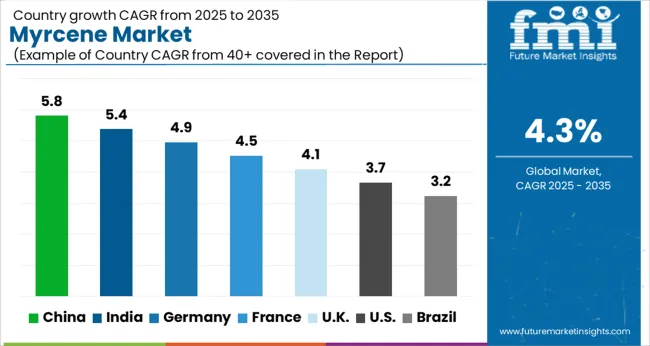
| Country | CAGR |
|---|---|
| China | 5.8% |
| India | 5.4% |
| Germany | 4.9% |
| France | 4.5% |
| UK | 4.1% |
| USA | 3.7% |
| Brazil | 3.2% |
The Myrcene Market is expected to register a CAGR of 4.3% during the forecast period, exhibiting varied country level momentum. China leads with the highest CAGR of 5.8%, followed by India at 5.4%. Developed markets such as Germany, France, and the UK continue to expand steadily, while the USA is likely to grow at consistent rates. Brazil posts the lowest CAGR at 3.2%, yet still underscores a broadly positive trajectory for the global Myrcene Market. In 2024, Germany held a dominant revenue in the Western Europe market and is expected to grow with a CAGR of 4.9%. The USA Myrcene Market is estimated to be valued at USD 41.7 million in 2025 and is anticipated to reach a valuation of USD 59.7 million by 2035. Sales are projected to rise at a CAGR of 3.7% over the forecast period between 2025 and 2035. While Japan and South Korea markets are estimated to be valued at USD 5.3 million and USD 3.2 million respectively in 2025.
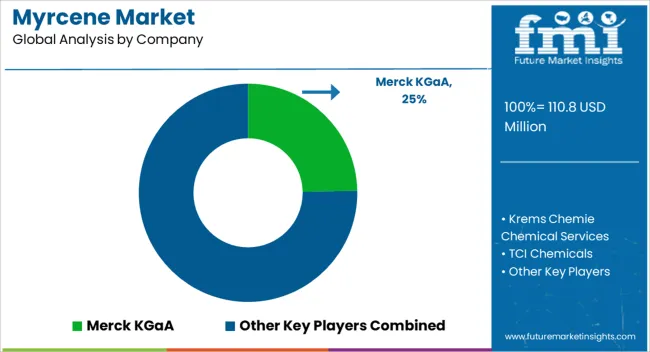
| Item | Value |
|---|---|
| Quantitative Units | USD 110.8 Million |
| Concentration | ≥ 90% Myrcene, ≤ 80% Myrcene, and 80% - 90% Myrcene |
| Application | Fragrance Intermediate and Flavor Intermediate |
| Regions Covered | North America, Europe, Asia-Pacific, Latin America, Middle East & Africa |
| Country Covered | United States, Canada, Germany, France, United Kingdom, China, Japan, India, Brazil, South Africa |
| Key Companies Profiled | Merck KGaA, Krems Chemie Chemical Services, TCI Chemicals, Santa Cruz Biotechnology, NIPPON TERPENE CHEMICALS, Glentham Life Sciences, Paris Chemicals, and Toronto Research Chemicals |
The global myrcene market is estimated to be valued at USD 110.8 million in 2025.
The market size for the myrcene market is projected to reach USD 168.8 million by 2035.
The myrcene market is expected to grow at a 4.3% CAGR between 2025 and 2035.
The key product types in myrcene market are ≥ 90% myrcene, ≤ 80% myrcene and 80% - 90% myrcene.
In terms of application, fragrance intermediate segment to command 58.1% share in the myrcene market in 2025.






Full Research Suite comprises of:
Market outlook & trends analysis
Interviews & case studies
Strategic recommendations
Vendor profiles & capabilities analysis
5-year forecasts
8 regions and 60+ country-level data splits
Market segment data splits
12 months of continuous data updates
DELIVERED AS:
PDF EXCEL ONLINE
Dihydromyrcene Market Size and Share Forecast Outlook 2025 to 2035

Thank you!
You will receive an email from our Business Development Manager. Please be sure to check your SPAM/JUNK folder too.
Chat With
MaRIA